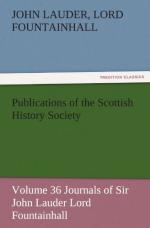[19] Scottish History Society.
[20] Journal, p. 21.
On the other hand, his opinions on all subjects, on public affairs and public men, on such questions of speculation or ethical interest as astrology and witchcraft, often strikingly expressed in language always racy and sincere, are scattered through the published volumes of his writings, all printed without note or comment. It may at least be a tribute to Fountainhall’s memory to present a short view of his opinions, and for that purpose I have not scrupled to quote freely, especially from the Historical Observes, a delightful book, which deserves a larger public than the limited circle of its fortunate possessors. Fountainhall’s political opinions were moderate, in an age when moderation was rare. We are tempted to think, if I am not mistaken, that in that dark period of Scottish history, every man was a furious partisan, as a Royalist or a Whig, or as an adherent of one or other of the chiefs who intrigued for power. But it may be that Lauder’s attitude reflects more truly the average opinions of educated men of the time.
HIS POLITICAL OPINIONS
His political position has perhaps been imperfectly understood by the few writers who have had occasion to refer to it. Mr. Laing’s statement, that prior to the Revolution ’he appears generally to have acted only with those who opposed the measure of the Court,’ is not, I venture to think, wholly accurate. It is true that on one occasion, no doubt memorable in his own life, he incurred the displeasure of the government. When James VII. on his accession proposed to relax the penal laws against Roman Catholics, while enforcing them against Presbyterians, Lauder, who had just entered Parliament, opposed that policy and spoke against it in terms studiously moderate and respectful to the Crown. The result, however, was that he became a suspected person. As he records in April 1686, ’My 2 servants being imprisoned, and I threatened therewith, as also that they would seize upon my papers, and search if they contained anything offensive to the party then prevailing, I was necessitat to hide this manuscript, and many others, and intermit my Historick Remarks till the Revolution in the end of 1688.’




